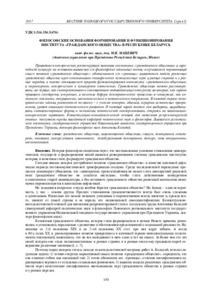Please use this identifier to cite or link to this item:
https://elib.psu.by/handle/123456789/20548| Title: | Философские основания формирования и функционирования института «гражданского общества» в Республике Беларусь |
| Authors: | Мацевич, М. Я. |
| Issue Date: | 2017 |
| Publisher: | Полоцкий государственный университет |
| Citation: | Вестник Полоцкого государственного университета. Серия E, Педагогические науки. - 2017. - № 7. - С. 150-154. |
| Abstract: | Проводится историческая реконструкция эволюции института «гражданского общества» в европейской культуре на основании выявления его философских идеальных типов; очерчивается нормативный смысл понятия «гражданское общество»; обозначаются его «границы»; выявляются модели различных гражданских обществ через констатацию специфических неотъемлемых черт в разных странах и у разных народов, а также показывается природа функционирования института «гражданского общества» в структурном, историческом и культурном контекстах. Гражданское общество можно рассматривать: во-первых, как самоорганизацию и самоэволюцию индивидуальных интересов; во-вторых, как гарант правового государств; в-третьих, в качестве буфера демократических процессов; в-четвертых, как институт гласности, открытости, аксиологического и политического плюрализма. В каждой стране демократические идеалы реализуются по-своему – с учетом истории, обычаев, иерархии ценностных приоритетов, уровня социально-экономического развития. И каждый народ должен сам выбирать, вырабатывать соответствующие формы и механизмы политической самоорганизации, опираясь на национально-историческую традицию. Концептуально-методологической основой для написания репрезентируемой статьи послужили труды заведующей кафедрой политических наук и философии Львовского регионального института государственного управления Национальной академии государственного управления при Президенте Украины, доктора философских наук Антонины Колодий.= The article delineates the historical reconstruction of the evolution of the institute «civil society» in the European culture on the basis of the revelation of its philosophical ideal types. The author explicates the normative sense of the notion «civil society» and marks the «borders»; reveals the models of different civil societies by means of the fixation of specific inherent features of different countries and nations; describes the nature of the functioning of the institute «civil society» in structural, historical and cultural contexts. Civil society might be considered: firstly, as self-organization and self-evolution of individual interests. Secondly, as a guarantee of legal state. Thirdly, as a buffer of democratic processes. Fourthly, as an institute of glasnost (publicity), openness, axiological and political pluralism. The democratic values are fulfilled in specific ways in different countries - taking into account a history of customs, a hierarchy of value priorities, a level of social and economic development. And every nation should choose, produce the correspondent forms and mechanisms of political self-organization, relying on national and historic traditions. The conceptual and methodological basis of this article is constructed by means of the articles of the Doctor of Philosophical Sciences Antonina Kolodiy, the Head of the Department of Political Sciences and Philosophy of the Lvov Regional Institute of the State Government, the National Academy of the President of Ukraine. |
| Keywords: | Гражданское общество Цивилизованное общество Социум Демократия Солидаризм Этизация Civil society Civilization Society Democracy Solidarism Ethization |
| URI: | https://elib.psu.by/handle/123456789/20548 |
| metadata.dc.rights: | open access |
| Appears in Collections: | 2017, № 7 |
Files in This Item:
| File | Description | Size | Format | |
|---|---|---|---|---|
| 150-154.pdf | 175.8 kB | Adobe PDF |  View/Open |
Items in DSpace are protected by copyright, with all rights reserved, unless otherwise indicated.